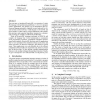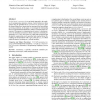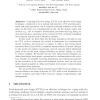359
Voted
PPDP
2015
Springer
9 years 10 months ago
2015
Springer
Ten years ago we introduced ReactiveML, an extension of a strict ML language with synchronous parallelism `a la Esterel to program reactive applications. Our purpose was to demons...
371
Voted
PPDP
2015
Springer
9 years 10 months ago
2015
Springer
Session-based concurrency is a type-based approach to the analysis of communication-intensive systems. Correct behavior in these systems may be specified in an operational or dec...
326
Voted
PPDP
2015
Springer
9 years 10 months ago
2015
Springer
We propose Lasp, a new programming model designed to simplify large-scale distributed programming. Lasp combines ideas from deterministic dataflow programming together with con�...
89
Voted
ATVA
2015
Springer
9 years 10 months ago
2015
Springer
We present ASSA-PBN, a tool for approximate steady-state analysis of large probabilistic Boolean networks (PBNs). ASSA-PBN contains a constructor, a simulator, and an analyser whic...
96
Voted
ATVA
2015
Springer
9 years 10 months ago
2015
Springer
Inconsistent code detection is a variant of static analysis that detects statements that never occur on feasible executions. This includes code whose execution ultimately must lead...
82
Voted
ATVA
2015
Springer
9 years 10 months ago
2015
Springer
Of special interest in formal verification are safety specifications, which assert that the system stays within some allowed region, in which nothing “bad” happens. Equivalen...
171
Voted
ATVA
2015
Springer
9 years 10 months ago
2015
Springer
The reachability problem is one of the most important issues in the verification of hybrid systems. Computing the reachable sets of differential equations is difficult, although c...
112
Voted
ATVA
2015
Springer
9 years 10 months ago
2015
Springer
Runtime verification and model checking are two important methods for assessing correctness of systems. In both techniques, detecting an error is witnessed by an execution that vi...
102
Voted
ATVA
2015
Springer
9 years 10 months ago
2015
Springer
Combinatorial test design (CTD) is an effective test design technique, considered to be a testing best practice. CTD provides automatic test plan generation, but it requires a man...
85
Voted
ATVA
2015
Springer
9 years 10 months ago
2015
Springer
Replicated data types store copies of identical data across multiple servers in a distributed system. For the replicas to satisfy strong eventual consistency, these data types sho...







